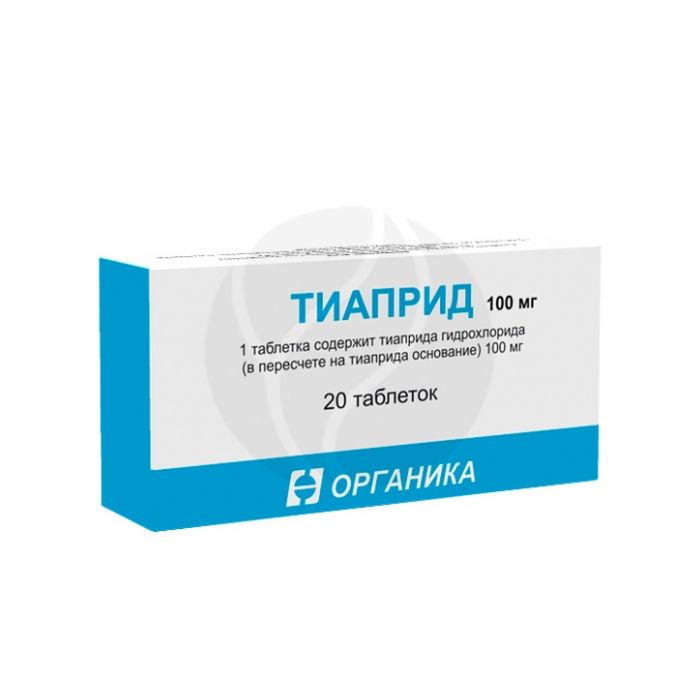Tiaprid tablets 100mg, No. 20
Expiration Date: 11/2025
Russian Pharmacy name:
Тиаприд таблетки 100мг, №20
Agitation,
aggressiveness, especially in chronic alcoholism, in the elderly;
resistant to therapy, severe pain syndrome;
chorea,
tics with Tourette's disease,
severe behavioral disorders, accompanied by aggressiveness and agitation.
Individual, depending on the indications, the age of the patient and the dosage form used.
Pills
1 tab.
tiapride (in the form of hydrochloride) 100 mg
The presence or suspicion of prolactin-dependent tumors, pheochromocytoma;
hypersensitivity to tiapride.
pharmachologic effect
An antipsychotic agent (neuroleptic) from the group of substituted benzamides. The antipsychotic effect is due to the blockade of dopamine D2 receptors of the mesolimbic or mesocortical system. It has an analgesic effect for interoceptive and exteroceptive pain. Has a sedative effect due to the blockade of adrenergic receptors of the reticular formation of the brain stem; antiemetic action associated with the blockade of dopamine D2 receptors in the trigger zone of the vomiting center; hypothermic action due to blockade of dopamine receptors in the hypothalamus.
Pharmacokinetics
After oral administration, it is rapidly absorbed from the gastrointestinal tract. Cmax in blood plasma is reached after 1 hour. Plasma protein binding is low. Penetrates the BBB. T1 / 2 is 3-4 hours. It is excreted by the kidneys mainly unchanged.
With renal failure, the elimination of tiapride from the body slows down.
Side effect
From the side of the central nervous system: drowsiness, sleep disturbances, agitation, indifference, dizziness, headaches, parkinsonism syndrome; rarely - spastic torticollis, oculogyric crises, akathisia, tardive dyskinesia; in some cases - ZNS.
From the endocrine system: rarely - symptoms caused by hyperprolactinemia (amenorrhea, galactorrhea, enlargement of the mammary glands, pain in the mammary glands, impotence, disorders of reaching orgasm.
From the side of the cardiovascular system: an increase in the QT interval, orthostatic hypotension; in some cases - arrhythmias of the 'pirouette' type.
Application during pregnancy and lactation
During pregnancy, tiapride is used only for absolute indications in the minimum effective doses. For newborns whose mothers received tiapride during pregnancy, it is recommended to monitor the functions of the central nervous system and gastrointestinal tract.
It is not known whether tiapride is excreted in breast milk. If necessary, use during lactation, breastfeeding should be discontinued.
Application for impaired renal function
Use with caution in renal failure.
Use in elderly patients
Use with caution in elderly patients.
special instructions
Use with extreme caution in patients with epilepsy due to a possible lowering of the seizure threshold.
Use with caution in severe cardiovascular diseases, parkinsonism, renal failure, as well as in elderly patients.
Parenteral administration is carried out under the supervision of a physician.
During the period of treatment with tiapride, levodopa, dopamine receptor agonists (amantadine, apomorphine, bromocriptine, cabergoline, entacapone, lisuride, pergolide, piribedil, pramipexole, quinagolide), sultopride should not be used; drugs that can cause arrhythmias of the 'pirouette' type (antiarrhythmics class IA and III, chlorpromazine, levomepromazine, thioridazine, trifluoperazine, sultopride, droperidol, haloperidol, pimozide, bepridil, cisapride, difemanil, erythromycin for vintromycin / in the introduction, as well as halofantrine, morfloxacin, pentamidine, sparfloxacin).
Avoid drinking alcohol.
Influence on the ability to drive vehicles and use mechanisms
It is used with caution in patients whose activities require concentration of attention and high speed of psychomotor reactions.
Drug interactions
With the simultaneous use of drugs that depress the central nervous system (including opioid analgesics, antihistamines, barbiturates, benzodiazepines), it is possible to increase the inhibitory effect on the central nervous system.
With the simultaneous use of antihypertensive drugs, an increase in the hypotensive effect is possible.

